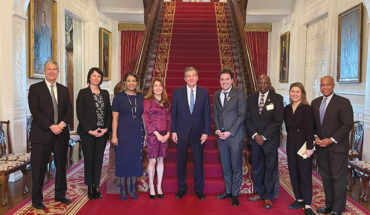Jim Hunt is moving. It’s a word that describes what he’s doing, how he operates, why he’s successful, and what he has accomplished for North Carolina and its people. At 75, the four-term governor and one-man Democratic political dynasty remains one of the most tireless Tar Heels in history, still pushing the state forward according to his vision.
A few days before Christmas, he’s packing up boxes. Retiring from Womble Carlyle Sandridge & Rice, the law firm where he has served as rainmaker for 12 years since leaving the governor’s mansion, Hunt is moving to the new $115.2-million James B. Hunt Jr. Library at N. C. State University’s Centennial Campus.
He packs between receiving visitors, making calls, and preparing to host a bipartisan annual retreat that teaches new legislators effective governing skills. Beyond that, he’ll chair the two university institutes he helped found, and he travels constantly. The one thing that’s never not packed is Hunt’s schedule.
Twelve years ago, he was going to slow down. He didn’t then, and he’s not likely to start now. Instead, he’ll be doing the same thing he has done for 40 years. He just occasionally moves offices.
“I like it put that way!” he says, and laughs, a happy, relaxed chuckle that makes it clear he doesn’t want to stop because he loves what he does.
“He’s Jim Hunt, and he’s always going to be Jim Hunt, and he believes he’ll be able to do it until he’s 110,” says Phil Carlton, his longtime friend and a former State Supreme Court Justice.
Connections, advice, getting things done
Time and experience change each of us — for the better, we hope. Both factors have been good friends to the Wilson County farm boy who first saw what government could do for people when trucks paved the dirt roads by his family’s land. Although his physical frame is smaller, the famous swoop of hair now white, Hunt seems larger and more comfortable than ever as elder statesman.
Always “on fire” to get things done for North Carolina, in younger years Hunt often came off a one-gear guy who was not much for wasting time by looking backwards or inward. The intensity and focus he brings to his work haven’t waned, but he has burnished his public persona to a pleasant warmth.
Which is why, every day, people come to see Hunt. They come for connections, advice, help in getting things done. Always to talk. They seek perspective from a man whose breadth of experience, influence, and foresight about the state of North Carolina is second to none.
From the governor’s office, he led the state through two decades of dramatic economic change and educational reform, spearheading its transformation from a farming-, furniture- and textile-based economy to one fueled by knowledge-driven industries in biotechnology, pharmaceuticals and information technology. Out of office, he maintained and extended his clout, continuing to lead North Carolina’s economic development while shaping policy education on a national level.
“It’s hard, at least on the Democratic side, to think of anybody who would approach Jim Hunt in the magnitude of importance he has had in North Carolina politics over the past half- century,” says Andy Taylor, a professor of political science at N.C. State. “He still is very much a rainmaker. He understands that he can open doors for people that they cannot open themselves, but I also think he and others around him still have something to contribute in the area of political policy ideas.”
Ideas, and talking, are things Hunt loves, and what still fuels him. He loves to get to know people, so between boxes and calls, he paused for a meandering conversation that dipped in and out of decades, over issues, around challenges and successes. What he described were the most elemental aspects of his lifelong job; making the world see North Carolina differently, and inspiring his fellow citizens to view themselves and their state in a new way.

Justin Paige sits on the Governor’s lap as Gov. Hunt listens to concerns of Tonya Taylor, a single mother, at Gov. Hunt’s press conference seeking a children’s health insurance program in 1998.
For Hunt, leadership has roots in his deep faith in God. “You’ve got to care about people,” he said, “All the people. And you have to understand that we all succeed when everyone reaches their potential. That is where leadership, no matter what the field, begins.”
For years, he said, when someone came to him looking for a job or connection, Hunt would appraise a resume and references, consider accomplishments. Those, he has realized, are not as important as character.
“I really do try to look at what is in a person’s heart now,” he says. “Are they here because they really want to help people, or do they just want to get ahead? I look for the people who just really want to help others.”
That is where, he says, his own leadership began. “I will never forget sitting in a classroom at N.C. State where we were learning about how many textile jobs were leaving the state,” he began. “I mean to tell you they were just flowing out of here. It was the early ’60s and Research Triangle Park had just begun, but not much was happening there yet. I just thought to myself, ‘What in the world are we going to do?’”
He decided that public service was the way to make the biggest difference in the most areas – from education to health and infrastructure. Politics was the necessary avenue. And that question — “What in the world is North Carolina going to do?” — still drives him.
“Leaders have to constantly keep learning,” he says. They have to read and think and steal ideas, and figure out what will work. He knew that North Carolinians needed well-paying jobs, which required education. He traveled the country, and the world, talking, studying, talking more. Then he brought those conversations and concepts home.
Thus came the North Carolina School of Science and Mathematics, the North Carolina Biotechnology Center, and the Microelectronics Center of North Carolina. Centennial Campus, his brainchild, is the country’s largest university research park. Smart Start, his early childhood education initiative, is now a national model.
Transformational is an apt word to describe Hunt’s influence, says Ferrel Guillory, a professor of journalism and the director of the Program on Public Life at the University of North Carolina at Chapel Hill. “He put the state on the map on early childhood education. He put the state on the map with paying teachers better, and in education reform.”
It took a lot of work, and even more talking. “A leader has to be constantly sharing information, educating people,” Hunt says. “You can’t know how much time I spent talking with legislators. They used to say, ‘Governor, we are so sick of hearing about Smart Start!’ ”
Sighs. Chuckles. Memories. The political battles. The arm-gripping conversations, over and over again.
“But you can’t stop. You have to be constantly educating.”
Since Hunt left office, he has continued to lead in significant ways, even if they didn’t make news, Guillory says. In 2003, working with UNC-Chapel Hill, he started the James B. Hunt Jr. Institute for Educational Leadership and Policy, to train governors and legislators from other states and their staffs about education issues. Guillory says the Hunt Institute played a major role in the early development of the Common Core Curriculum for elementary education that has been adopted by nearly all states.
New challenge
Hunt’s move to the library that is his namesake occurs against the backdrop of another historic transition. For the first time since the 1800s, Republicans control both houses of the state legislature and governor’s office. Politically, the state is moving in a different direction, and many of Hunt’s signature policy programs may face deep cuts.
He has already been reaching out to those in power. He worries about the fate of North Carolina Teaching Fellows in particular. “We have to have excellent universities; it’s the one thing we have had. Out of them come the ideas, and that’s been the North Carolina way. The universities work together. We all work together. We go out and say, ‘Let’s do this as a state.’ ”
Republicans, he says, will have to learn how to govern. Just as his party had to do. “I have a lot more respect for bipartisan effort now,” he says, noting that he and former Gov. Jim Holshouser work together on many issues, including teaching new legislators.
Once he has settled into his new offices, more typical retirement pursuits will keep Hunt on the move. He acknowledges that his wife Carolyn would like him at home on the farm in Wilson more often, and there are plans this spring and summer to visit grandchildren in Europe. Carlton has taken on the monumental task of helping Hunt get his personal affairs in order, and that may require more time than either man has left on this earth.
“He has so many papers at that house that I’m not sure the 12 disciples collectively could cope with it,” Carlton jokes.
Asked how many hours he plans to work in this new phase, Hunt hems, haws. He notes the evening meetings, the conferences to organize and attend. He’s not going to quit working the farm, rising at 5 a.m. to put out hay for the cattle. There has to be time to read, because there’s always so much to stay on top of, to learn. It’s easier to quantify the hours he has promised not to work. “It was a big decision when Mrs. Hunt and I decided to switch to watching the 10 o’clock news instead of the 11,” he explains.
Frankly, it would be hard not to want to work at Hunt’s new office. The Hunt Library is a technological marvel; a visionary place for a new digital age. And not only is N.C. State Hunt’s alma mater, the Centennial Campus also was created after he transferred the land to the university during his second term as governor.
The library is a soaring and inspiring piece of sustainable architecture, with book-fetching robots, expansive meeting space, and digital screens as far as the eyes can see. But its purpose fundamentally captures Hunt’s pragmatic style.
The Emerging Issues Commons is a gathering place where visitors can see and hear stories about real North Carolinians across the state. A staggering amount of information is available to create networks and collaborate. Anybody can use its tools in person or online to help move his or her community forward.
And this, Hunt says, is the new iteration of public service: providing tools to help communities improve, in ways just as fundamental as the paved road that connected his hometown to the capital city.
“We can literally help the people be in charge of their democracy,” he says. “I want the people, the young people, to learn about all these issues. They don’t need to be told by the experts. I want them to think about it and talk about it back home…so they are actively involved in setting the agenda.”
Maybe the most important thing Hunt has learned is to have faith in the people who are trying to lead. He knows that the state he loves has all the things people want: natural beauty, educational opportunities, high-paying jobs, exciting places to live.
“I used to worry about how we haven’t figured out what the next big thing is going to be, what industry was going to save us. We don’t know. We can’t know. But what you can know is that the bright, innovative, creative people will come up with it. The most bright people will lead it.”




